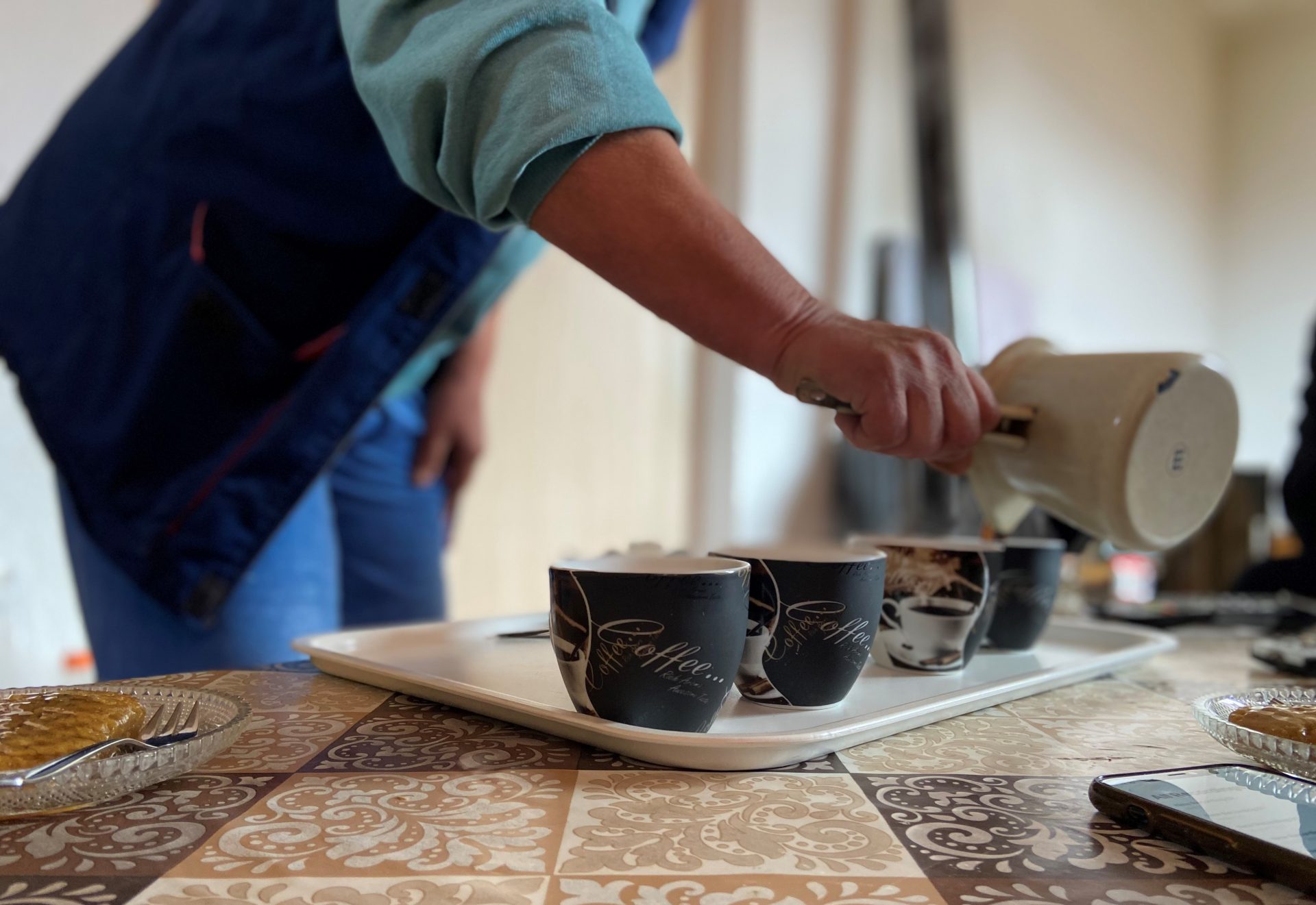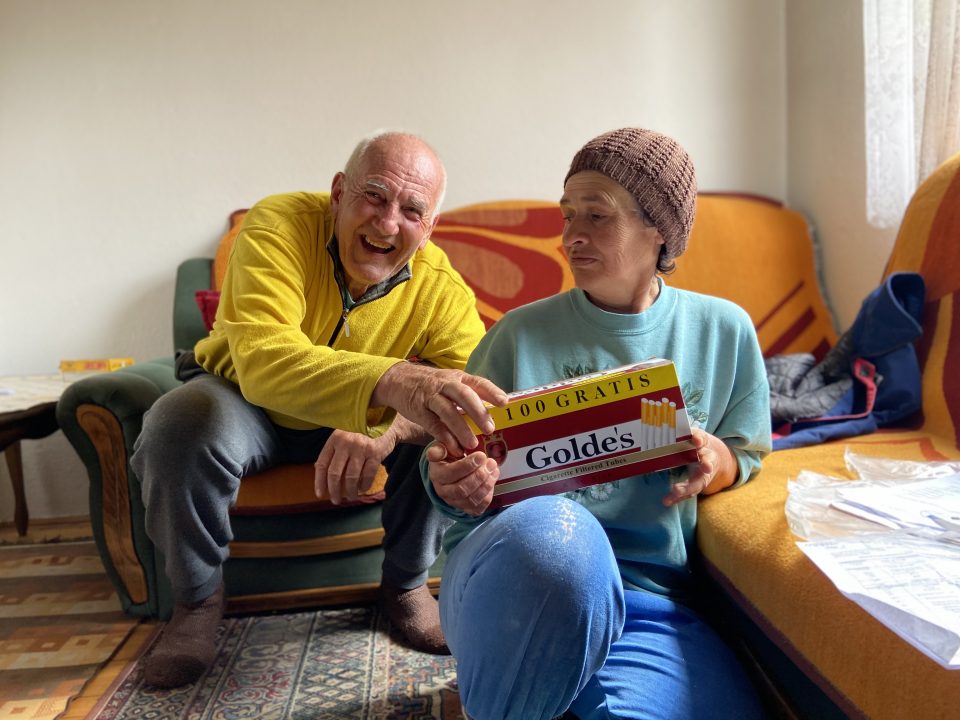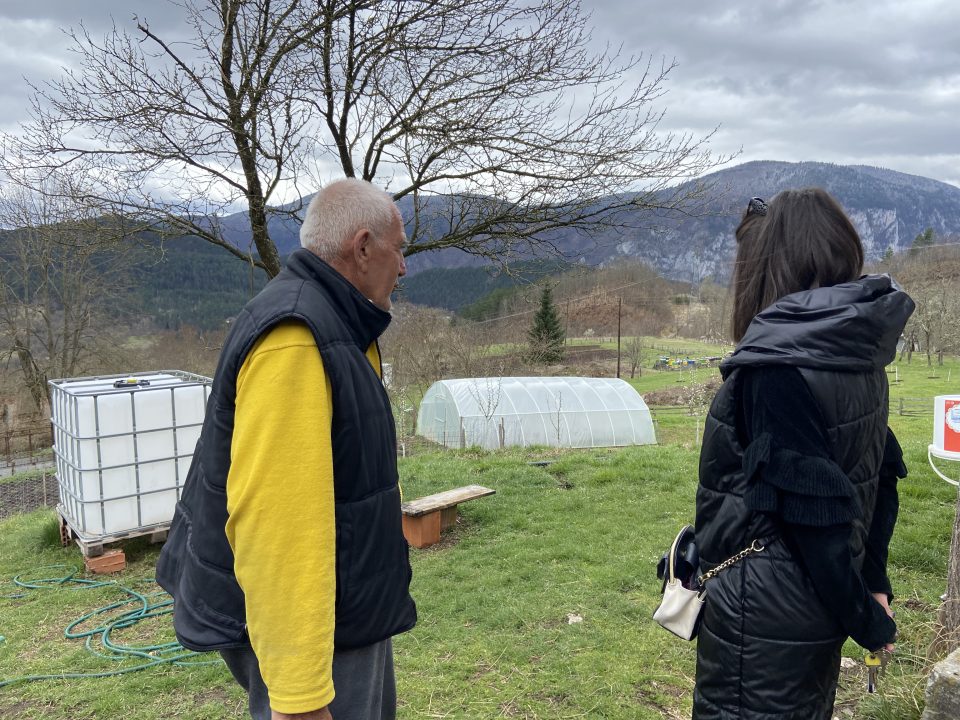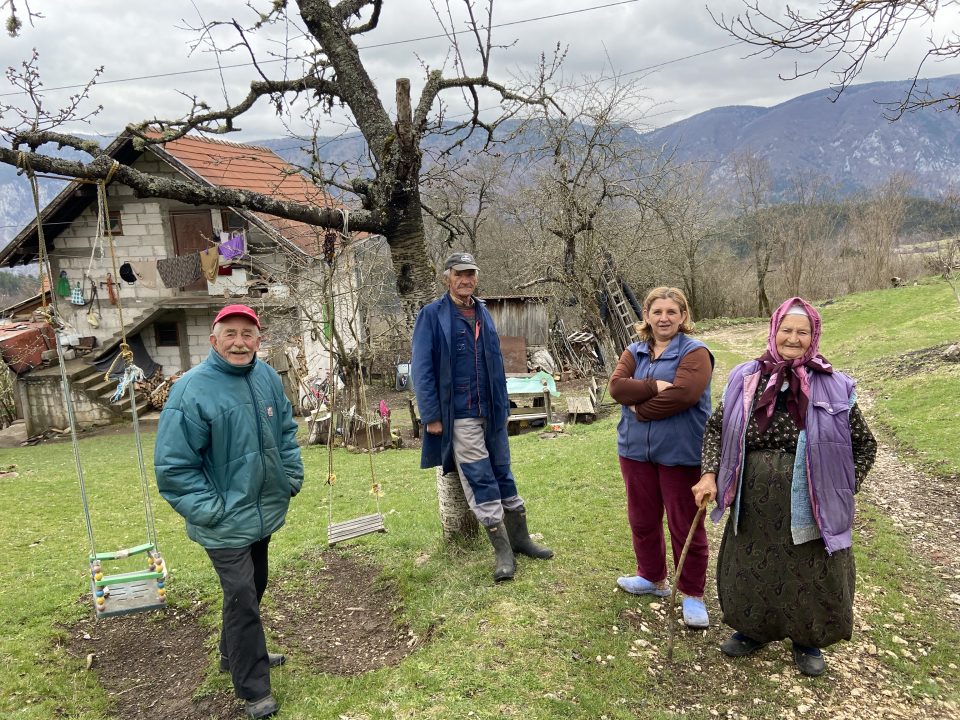
In Višegrad, which was subjected to one of the most ruthless ethnic cleansing campaigns during the war, Bosniak returnees we visited claim that interethnic relations are currently friendly, but that if there was no tourism around the famous Mehmed Pasha Sokolović Bridge and the Višegrad hydroelectric power plant “the city would be dead.“
“Come on in, my wife has been waiting for you for a month,” says Omer Kapetanović as we enter the house that he inhabits with his wife, Sehija. Although we informed Kapetanović of our arrival only a week before, he says this anyway.
“First, coffee,” says Sehija as she puts coffee cups and homemade cookies for us on the table, pouring the coffee from a pot in the traditional Bosnian way. Omer offers a taste of his homemade apple brandy.

Omer and Sehija Kapetanović are returnees – people who came back to the pre-war places of residence that they had left because of the war.
In their municipality (Višegrad), there were systemic attacks, killings, and torture of Muslims, which led to a considerable change, an almost complete disappearance of the Muslim population. The International Criminal Tribunal for the former Yugoslavia has found that Višegrad was subjected to one of the most ruthless campaigns of ethnic cleansing in Bosnia and Herzegovina.
According to the pre-war census, the village of Kapetanovići had 47 inhabitants; now, Omer and Sehija are living alone there. Conditions are difficult. Although they can reach their home only by unpaved road, they are pleased that after two years of trying, they managed to get electricity to their dwelling with the help of Bosnian Serbs.

Omer took out a loan, started keeping bees, bought a cow, roofed their stable and garage, and built a porch to the house. He brought water to their garden. Sehija makes preserves for the winter, jam, and ajvar, a famous Balkan spread made of eggplants and bell peppers. We also had the privilege of tasting her homemade sirnica, another Balkan culinary wonder. This cottage cheese-filled pastry is famous in the region, but we could tell that Sehija added some extra ingredients, making it even more delicious.
Back in Višegrad town, we met Edin Karaman, a municipal councilor. He returned to Višegrad in 2008, where he lives with his wife and two daughters. He says he is available to help returnees daily. Being a child of a village (as he calls himself), he is sometimes called on to do anything and everything, including delivering a newborn calf when required.
An Eerily Peaceful City in the Evening
Describing the demographic situation, Karaman says that 13,471 Bosnian Muslims lived in the municipality before the war, whereas now only 1,145 live there.
“The number rises a little bit in the summer, with the coming of the so-called weekenders – people who only come to visit their pre-war homes from the diaspora or other places in Bosnia for a limited amount of time.” Karaman explains, adding “…the town of Višegrad is eerily quiet in the evening, compared to what it was like before the war.”
If it were not for the tourism around the famous Mehmed Pasha Sokolović Bridge and the Višegrad hydroelectric plant, the town would be dead, he says. Karaman worries that if the situation continues like this, in twenty years, the number of Bosnian Muslims will be reduced to a statistical error.
We wonder whether the brutal war crimes and violence prevented more people from returning to Višegrad. An indescribable evil marked the massacres; people were burned alive in their homes. Trial Chamber President Patrick Robinson said: “The crimes in this case committed by Milan Lukic and Sredoje Lukic were characterized by reckless and perverted contempt for human life.”
Legal Proceedings and Sentences
The Trial Chamber found that Milan Lukić personally killed at least 132 Muslim civilians in early June 1992 in just a few days. “Milan Lukić played a major role in the events in Pionirska and Bikavac, in which 59 people were burned alive in the first case and at least 60 in the second,“ the International Criminal Tribunal for the Former Yugoslavia (ICTY) wrote.
According to its final ruling, ICTY sentenced Milan Lukić to life in prison as the leader of the White Eagles or Avengers, a local Bosnian Serb paramilitary group, while Sredoje Lukić, a member of the same paramilitary unit, was sentenced to 27 years in prison. Mitar Vasiljević, a member of the same paramilitary unit that cooperated with the police and various military units stationed in Višegrad, was sentenced to 15 years in prison.
The Court of Bosnia and Herzegovina sentenced Radomir Šušnjar, one of the commanders of Serbian paramilitary units, to 20 years in prison, and Momir Savić, a member of an unidentified paramilitary formation during the activities of the former Yugoslav People’s Army’s Užice Corps, and the Commander of the 3rd Company of the Višegrad Brigade of the Republika Srpska Army, was given a prison sentence of 17 years.
For crimes in Višegrad, the ICTY and the Court of BiH sentenced other members of the military and police forces as follows:
Boban Šimšić, a member of the reserve police force of the Ministry of Internal Affairs of the Republika Srpska was sentenced to 14 years in prison,
Predrag Milisavljević, a member of the Reserve Police within the Public Security Station in Višegrad and of the Višegrad Brigade of the Army of Republika Srpska to 20 years in prison,
Miloš Pantelić, a member of the Reserve Police within the Public Security Station in Višegrad and of the Višegrad Brigade of the Army of Republika Srpska to 15 years in prison,
Željko Lelek, police officer in Višegrad, to 16 years in prison,
Vitomir Racković, member of the Territorial Defense of the Serb Municipality of Višegrad, and later a member of the IV Company of the Višegrad Brigade of the Army of the Republika Srpska (VRS), to ten years in prison,
Nenad Tanasković, a reserve policeman in the Višegrad Public Security Station, then the Trebinje Security Service Center, to eight years in prison,
Petar Kovačević, a member of the Army of Republika Srpska to nine years in prison, Oliver Krsmanović, a member of the Army of Republika Srpska, to 18 years in prison, Mićo Jovićić, a member of the 2nd Podrinje Light Infantry Brigade Višegrad of the Army of Republika Srpska, to five years in prison,
Momir Tasić, a member of the Army of Republika Srpska to 14 years in prison and Petar Tasić, a member of the Army of Republika Srpska, to five years in prison.
High-ranking officials convicted of crimes in Višegrad include:
Radovan Karadžić, President of Republika Srpska, sentenced to 40 years in prison,
Momčilo Krajišnik, member of the Main Board of the Serbian Democratic Party and President of the Bosnian Serb Assembly, sentenced to 20 years in prison,
Biljana Plavšić, Serb representative in the BiH collective presidency, member of the collective and expanded Presidencies of the Bosnian Serb Republic in BiH (later Republika Srpska), which had de facto control over members of the Bosnian Serb armed forces, was sentenced to 11 years in prison and
Ratko Mladić, commander of the Main Staff of the Army of Republika Srpska, to life imprisonment.
The war legacy has not yet been resolved satisfactorily. The Vilina Vlas Hotel, which was used as a rape camp during the war, continues to operate without a reminder of its terrible past. Many still deny that such horrific crimes took place in Višegrad.
The city is often a gathering place for Serbian nationalists, the so-called Ravnogorski movement. Dušan Sladojević, Slavko Aleksić and Riste Lečić, members of the Ravna Gora Movement of the Fatherland of Srpska in Višegrad were accused of inciting religious and national hatred, discord, and intolerance among the constituent peoples of BiH on March 10, 2019.
The lower trial court in BiH found these defendants “not guilty.” In response, the president of the Association of Women Victims of War, Bakira Hasečić, said: “We will see what will be resolved in the Appellate Panel in the second instance verdict. But this is catastrophic; it is awful that the state of Bosnia and Herzegovina, and this Court, which is responsible for justice, is behind the Chetniks, war criminals who slaughtered, raped, killed, and ethnically cleansed us. This is a disaster for future generations to come.“
Letting Them Go to Safety
Ramiz Salkić, vice president of Republika Srpska – a BiH entity of which Višegrad is a part – said in late August last year that ethnic discrimination “remained a problem” urging the High Representative in Bosnia and Herzegovina to eliminate it.
In the village of Kapetanovići, Omer said that no one they knew of the 47 locals who lived in their town was killed during the war. The Serbian residents of the villages surrounding the village of Kapetanovići let them go to safety. Only Omer and Sehija returned in 2008. During the first visit of returnees to the village of Kapetanovići in 2003, an explosive device was detonated. Fortunately, no one was hurt. Even though it is well known who perpetrated the attack, nothing was done. It was only with the improvement of the security situation and legal reforms settling the issue of house ownership at the turn of the century that people started coming back to areas where they had lived previously.

Returnees to Višegrad are primarily living in the surrounding villages. Very few of them are in the city. According to the 1991 census, Bosniaks in Višegrad made up almost two-thirds of the municipality’s population, and the war reduced their share to ten percent.
When we asked Omer if he could list some of the problems he encountered as a returnee, he said: “No, no, really, nothing.” Karaman also claims that he “did not have any problems.”
Interethnic relations are friendly. The people we met don’t give up – they have everything it takes for their return to be prosperous and enduring.
This article was written by the spring cohort of Post-Conflict Research Center – PCRC’s interns in 2021 during their fieldwork in Višegrad. Authors include Samuel Raus, Chloé Heller, Amila Lelo, Emina Lišančić, and Dalila Kurtić.





